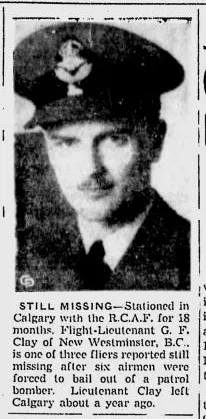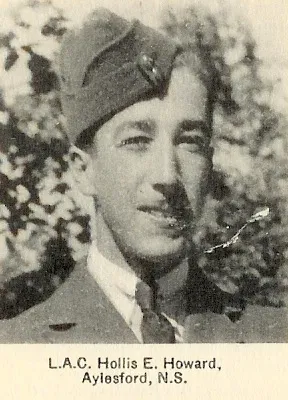Richardson, John Gordon (Flight Lieutenant)
Killed in Action 1940-November-17
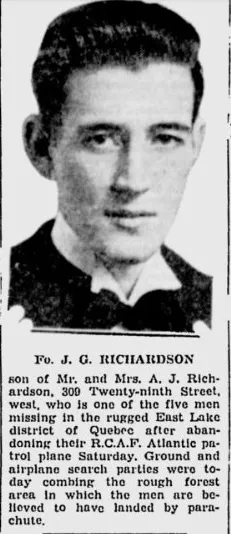

Birth Date: 1915
Born:
Parents: Son of Albert John and Margaret Richardson, of Saskatoon.
Spouse:
Home: Saskatoon, Saskatchewan
Enlistment:
Enlistment Date: unkown date
Service
RCAF
Unit
10 (BR) Sqn- Squadron
Base
Rank
Flight Lieutenant
Position
Pilot
Service Numbers
C/899
Crew or Other Personnel
Digby 749
Digby serial: 749
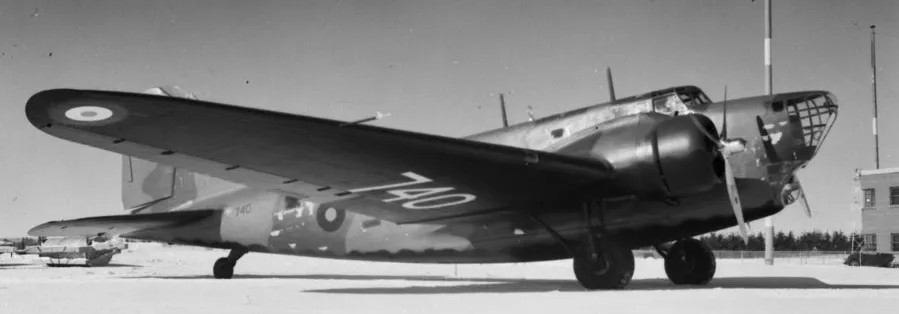
Douglas Digby Mk. I, RCAF (Serial No. 740), coded R, No. 10 (Bomber) Squadron, RCAF.
The RCAF acquired 20 Douglas Digby Mk. I in 1940. These were American twin engine B-18A Bolo bombers which served during the late 1930s and early 1940s. The Digby, named after the RAF school of bombing at RAF Digby, was based on the Douglas DC-2 airframe. The RCAF Digbys were immediately issued to No. 10 Squadron to replace the squadron's Westland Wapitis, to carry out anit-submarine patrol duties. RCAF Eastern Air Command (EAC) Digbys carried out 11 attacks on U-boats. U-520 was confirmed sunk by Flying Officer F. Raymes' crew of No. 10 (BR) Squadron, on 30 October 1942, east of Newfoundland. The Digby antisubmarine role was relatively short-lived, and they were superseded in this role in 1943 by Consolidated B-24 Liberators, which had a much heavier payload and a substantially longer range which finally closed the mid-Atlantic gap. Harold Skaarup web page
Aircraft Images
Digby 749
Digby Mk. I 749
Category A crash near Riviere du Loup, Quebec on 18 November 1940. Aircraft was en route from Newfoundland to St. Hubert, Quebec when it was forced to divert due to bad weather. Crew abandoned aircraft, probably as fuel ran low. Aircraft not located for some time. Reported to have come down in Maine, just across the border, as did some of the crew. 2 crew members drowned after landing in lake on Quebec side of border, one crew member found dead in Maine several weeks later, had apparently survived the bail out but succumbed to exposure and starvation. Ownership assigned to No. 4 Repair Depot in Scoudouc, NB on 3 March 1941, for write off.1940-03-22 Taken on Strength Eastern Air Command 2020-09-23
1940-November-17 Accident: 10 Squadron Loc: Lac De L'est Quebec Names: Benoit | Clay | Howard | Johnson | Leblanc | Richardson
1941-08-03 Struck off Strength 2019-08-20
Unit Desciption
10 (BR) Sqn ()
Battle honours
The Second World War
NORTH-WEST ATLANTIC, 1940-1945.
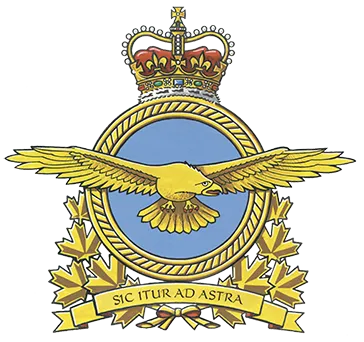
Lineage
Authorized as ‘No.10 (Torpedo Bomber) Squadron’ 1 April 1938.Footnote1
Redesignated 'No.10 (Bomber) Squadron' 28 August 1939.Footnote2
Redesignated 'No.10 (Bomber Reconnaissance) Squadron' 1 September 1939.Footnote3
Disbanded 13 August 1945.Footnote4
Notes:
No lineal connection with '10 Experimental Squadron', of 1967-70. See 10 Experimental Squadron.
Operational history
The Second World War
The squadron flew on anti-submarine operations on the Atlantic Coast under 'Eastern Air Command'.Footnote5
Footnotes
Footnote 1
GO 48/38. Authorized but not formed (AFGO 19/39)
Footnote 2
AFGO 41/39
Footnote 3
AFGO 57/39\
Footnote 4
Secret Organization Order 279, 4 August 1945, file S.17-10-1 (DOE), Kardex 181.009 (D5432)
Footnote 5
AFGO 25/40; Statement and Organization Charts for the Home and Overseas War and BCATP Organization, 15 April 1942, file S.8202, Kardex 181.002 (D421); Memorandum, Notes for CAS, Appendix A, 12 September 1939, Document Collection 77/543
Government of Canada